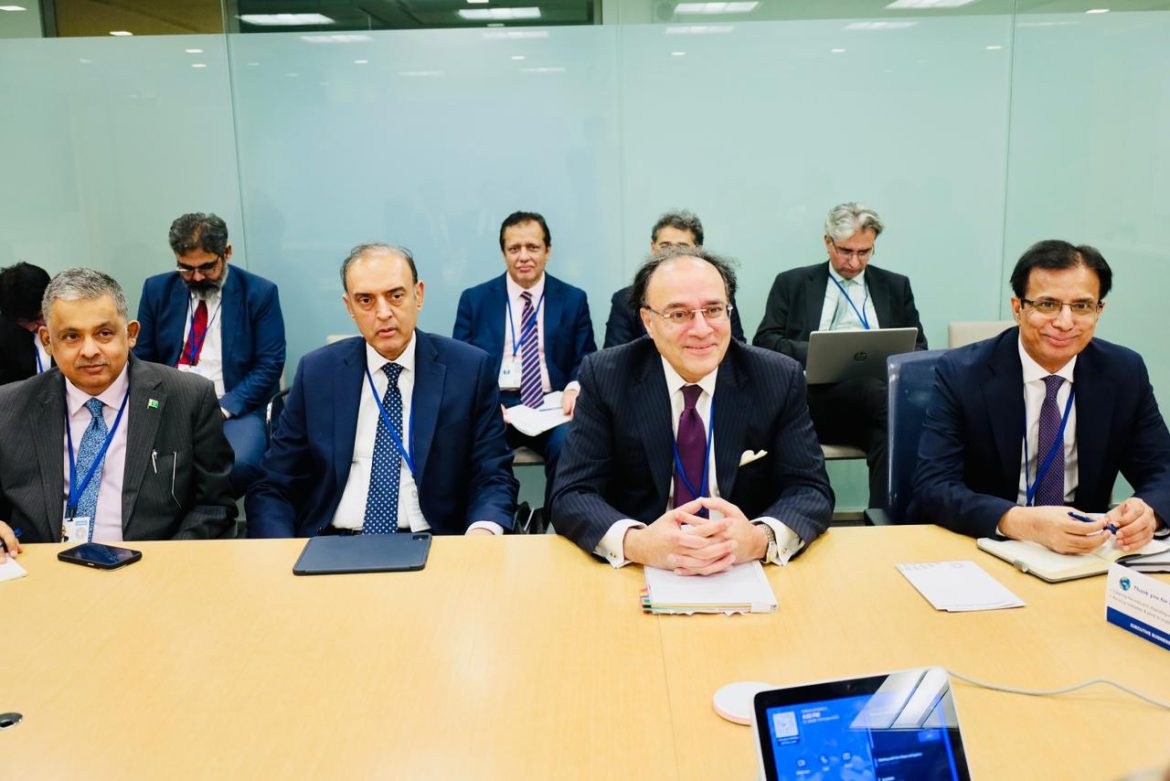ISLAMABAD ( WNAM REPORT ): Pakistan’s Finance Minister Senator Muhammad Aurangzeb reaffirmed the country’s commitment to macroeconomic reforms and deepened engagement with international financial institutions during a series of high-level meetings on the sidelines of the International Monetary Fund (IMF) and World Bank Group (WBG) annual meetings in Washington, D.C.
Aurangzeb met with IMF Director for the Middle East and Central Asia Jihad Azour and his team to review progress under the Second Review of Pakistan’s Extended Fund Facility (EFF).
Both sides underscored the importance of maintaining reform momentum and macroeconomic discipline.
The minister also met World Bank Senior Managing Director Axel van Trotsenburg, where he stressed Pakistan’s urgent need for investment in climate adaptation and mitigation. Citing the impact of recent floods on agriculture and growth, Aurangzeb reiterated the government’s commitment to addressing climate vulnerability and emphasized mobilizing additional resources to manage future climate-related disasters.
Focus on Climate Finance, Private Sector, and Trade
At the Commonwealth Finance Ministers’ Meeting, Aurangzeb called for operationalizing the Commonwealth Infrastructure and Financial Resilience Hub and emphasized the need for climate finance access for developing nations. He urged swift action on establishing mechanisms such as the Loss and Damage Fund.
Later, in a session with the U.S.-Pakistan Business Council (USPBC), Aurangzeb highlighted improvements in Pakistan’s macroeconomic indicators and stressed the importance of private sector-led growth. He cited recent trade agreements with the U.S. and expressed optimism over deeper bilateral engagement in mining, agriculture, IT, and pharmaceuticals. He assured business leaders their concerns would be addressed to promote investment.
Meetings with Key U.S. and International Stakeholders
Aurangzeb also held talks with Robert Kaproth, U.S. Assistant Treasury Secretary for International Finance, and Counselor Jonathan Greenstein. The discussion focused on Pakistan’s reform progress under the IMF program and recent legislation regulating virtual assets. The finance minister welcomed the conclusion of a new U.S. tariff deal and encouraged U.S. companies to explore opportunities in Pakistan’s energy, tech, and agriculture sectors.
In a separate meeting with Riccardo Puliti, IFC Regional Vice President, both sides agreed to expedite financial closure of the Reko Diq project and discussed scaling up private investment under the 10-year Country Partnership Framework. Aurangzeb welcomed the opening of IFC’s new regional office in Islamabad, calling it a step toward stronger collaboration.
Aurangzeb also met with Dr. Muhammad Sulaiman Al-Jasser, President of the Islamic Development Bank (IsDB), to review project progress, including funding for sections of the M-6 motorway. Discussions also covered cooperation in polio eradication, energy financing, and the development of a new Country Engagement Framework for Pakistan.
In a meeting with Citi Bank representatives, the finance minister acknowledged the institution’s longstanding partnership with Pakistan and discussed macroeconomic stabilization and opportunities in digital finance. He assured government support for Citi’s proposals, noting Pakistan’s emergence as a regional digital hub.
Media Engagements and Diplomatic Outreach
The minister also gave interviews to the Associated Press and Reuters and attended a dinner hosted by Pakistan’s Ambassador to the United States, Rizwan Saeed Sheikh, in honor of the visiting delegation.
The Finance Ministry said Aurangzeb’s engagements reflect Pakistan’s determination to strengthen ties with international partners, attract investment, and transition from economic stabilization to sustainable, inclusive growth.


